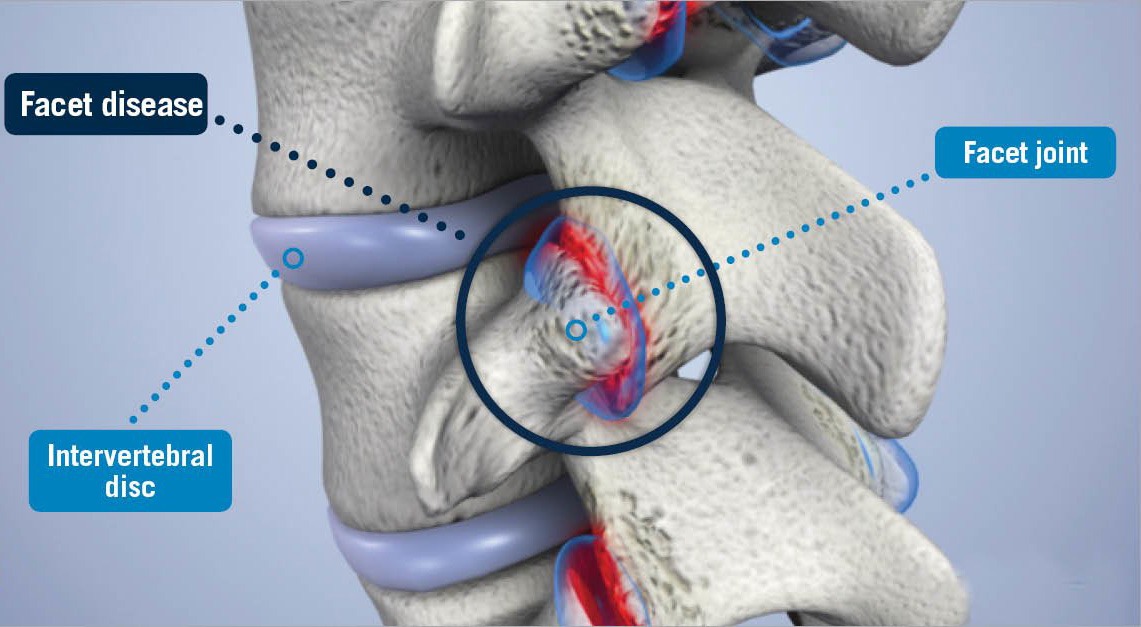Facet arthrosis, also known as facet joint osteoarthritis, is a degenerative condition that affects the facet joints in the spine. These joints, located between the vertebrae, enable smooth movement and flexibility of the spine. Arthritis, on the other hand, is a broader term encompassing various conditions that cause inflammation and stiffness in the joints.
Facet arthrosis occurs when the cartilage, which acts as a cushion between the facet joints, starts to wear down over time. This can happen due to age, repetitive stress, injury, or hereditary factors. As the cartilage deteriorates, the joints become inflamed and the bones may eventually rub against each other, causing pain, stiffness, and reduced mobility.
The symptoms of facet arthrosis are similar to those of arthritis in other joints. Patients may experience localized pain and stiffness in the affected area, difficulty in bending or twisting the spine, and even radiating pain towards the hips or legs. The severity of symptoms can vary, with some individuals experiencing mild discomfort, while others face significant debilitation.
Diagnosing facet arthrosis typically involves a physical examination, medical history evaluation, and imaging tests such as X-rays or MRI scans. Treatment for this condition aims to manage pain, reduce inflammation, and improve joint function. Non-surgical options include physical therapy, pain medications, steroid injections, and lifestyle modifications such as weight management and exercise. In severe cases where conservative measures fail to provide relief, surgical intervention might be considered.
Prevention plays a crucial role in managing facet arthrosis. Maintaining a healthy weight, practicing proper posture, avoiding excessive strain on the spine, and engaging in regular exercise can help keep the facet joints strong and reduce the risk of arthritis development.
In conclusion, facet arthrosis is a specific type of arthritis that affects the facet joints in the spine. Although it shares similarities with arthritis, it refers to the degeneration and inflammation of these particular joints. Early diagnosis and appropriate management can significantly improve the quality of life for individuals living with facet arthrosis.
How painful is facet arthrosis?
Symptoms of facet arthropathy commonly involve low back, neck, thoracic spine or cervical spine pain. This can range from a dull ache to chronic pain that makes it difficult to do daily activities. A spine specialist at NewYork-PresbyterianNewYork-PresbyterianNewYork-Presbyterian is one of the nation’s most comprehensive, integrated academic healthcare systems, encompassing hospital campuses, primary and specialty care clinics and medical groups, and an array of telemedicine services.https://www.nyp.org › locationsNewYork-Presbyterian Locations can help find the best treatment option for you.
What is the treatment for facet arthrosis?
Treatment / Management Physical therapy, pain medications, spinal manipulation, facet block, radiofrequency lesioning, and surgical intervention all can be used to treat pain related to facet degeneration. Physical therapy includes education of proper posture and restoration of correct body mechanics.Jul 4, 2023
Does facet arthropathy get worse over time?
Facet arthropathy can be painful and affect quality of life, making it serious enough to require treatment. Over time, spine degeneration can worsen over time and facet joints cannot heal once they become damaged.

How bad can facet joint pain be?
Lumbar facet pain occurs as radiating pain in the lower region of the back. Pain and tenderness can usually spread to the buttocks and deep within the thighs. Additionally, this condition can make it difficult and painful to do certain movements, such as getting up from a sitting position or standing straight.



